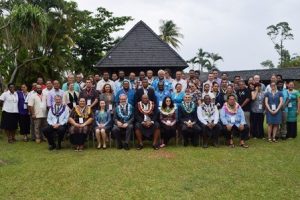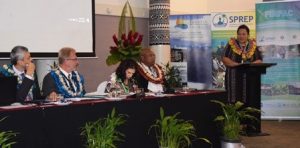2nd Pacific Islands Climate Outlook Forum

20th October 2016 The second Pacific Islands Climate Outlook Forum was officially opened with national, regional and international experts on climate services and disaster risk reduction present to explore common approaches and best practices for climate services that can be extended throughout the Pacific Island region. Two representatives from the Ministry of Meteorology, Energy, Information, Disaster Management, Environment and Climate Change (MEIDECC) Tonga attended this forum, Ms.Seluvaia Finaulahi from Meteorology and Ms.Luisa Taunga from NEMO.
With the cyclone season closing in, the two-day event hosted by the Fiji Meteorology Service in Nadi is placing a special focus on disaster risk reduction and the importance of climate information for community preparedness.
Fiji Ministry of Infrastructure and Transport Deputy Secretary, Policy and Planning, Mr Lui Naisara in his welcoming remarks, “Looking forward, we must be vigilant in the effective provisions of credible timely science information and dissemination and coordination of key agencies during such states of emergency, to ensure we minimise the impact to critical infrastructural systems that our economies are so dependent on, and more importantly, the safety and protection of human lives, particularly our vulnerable communities.”
Secretariat of the Pacific Regional Environment Programme’s Climate Change Director, Dr Netatua Pelesikoti said, “In a few weeks’ time, we will again enter the tropical cyclone season where destructive winds and waves can bring about devastation to our communities”.

“The PICOF concept is an opportunity to bring together the providers of climate information, that is, the National Meteorological and Hydrological Services and one of the end users of this information identified by the Global Framework for Climate Services, the Disaster Risk Reduction Community or the National Disaster Management Offices at the country level, in a roundtable discussion where information can be exchanged and guidance on decision-making.”
The Forum was targeted to improve the understanding of how seasonal climate outlooks are produced, how they are and can be made regionally and nationally relevant, and how they can be tailored to the needs of end users.
World Meteorological Organization representative, Ms. Lisa-Anne Jepsen in her opening speech thanked participants and organisers of the forum. “I am hoping that during the next two days we will be able to look forward and consider together how to make the PICOF process sustainable, strengthening communications between providers and users of climate services.”
The second Pacific Islands Climate Outlook Forum brought together national regional and international experts from the Meteorological Services Sector and the Disaster Risk Reduction, to provide a platform to consolidate seasonal forecasts from multiple sources to issue a consensus climate outlook for the Pacific region. Discussion of the Tropical Cyclone outlook for the upcoming Season, looking at El Nino 2015/2016 and how countries were affected and responses from Disaster Offices. The forum concluded with a regional statement that will provide guidance and emphasis on all the communities on the importance of preparedness and remaining vigilant.
Partners supporting the PICOF-2 are Secretariat of the Pacific Regional Environment Programme, World Meteorological Organisation, Environment and Climate Change Canada, United Nations Development Programme, Australian Bureau of Meteorology, Commonwealth Scientific and Industrial Research Organisation, Climate and Oceans Support Program in the Pacific, Government of Fiji – Fiji Meteorological Service, National Institute of Water and Atmospheric Research, National Oceanic and Atmospheric Administration, Pacific Meteorological Council, University of the South Pacific and the Government of the Russian Federation.
The PICOF-2 was undertaken with the financial support of the Government of Canada through the Federal Department of the Environment (Ce projet a été réalisé avec l’appui financier du gouvernement du Canada agissant par l’entremise du ministère fédéral de l’Environnement), financial contribution by the Government of the Russian Federation and the Government of Australia.
For further information please contact the Meteorology Division on 35355 or metstaff@met.gov.to. More information is also available at www.met.gov.to
Issued by the: Ministry of Meteorology, Energy, Information, Disaster Management, Environment, Climate Change and Communications

